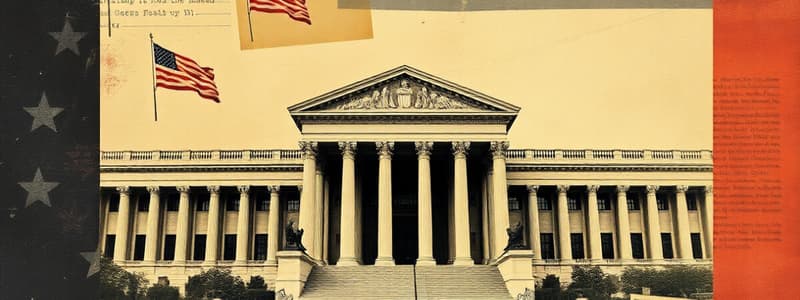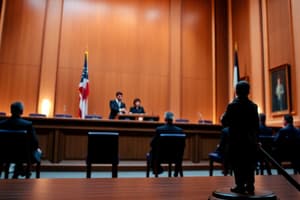Podcast
Questions and Answers
What is the primary purpose of criminal law?
What is the primary purpose of criminal law?
- To resolve personal disputes between individuals
- To punish and rehabilitate offenders (correct)
- To establish commercial regulations
- To protect intellectual property rights
What is the highest court in the U.S. judicial system?
What is the highest court in the U.S. judicial system?
- U.S. District Court
- State Supreme Court
- U.S. Supreme Court (correct)
- U.S. Court of Appeals
Which court has the authority to review decisions made by lower courts?
Which court has the authority to review decisions made by lower courts?
- Appellate Court (correct)
- Special Court
- Trial Court
- Constitutional Court
What distinguishes civil law from criminal law?
What distinguishes civil law from criminal law?
Which body confirms judges nominated by the President?
Which body confirms judges nominated by the President?
In the appeals process, if the appellate court does not find an error in the lower court's decision, what happens?
In the appeals process, if the appellate court does not find an error in the lower court's decision, what happens?
What establishes the authority of Congress to create Inferior Courts?
What establishes the authority of Congress to create Inferior Courts?
What is original jurisdiction in the context of court systems?
What is original jurisdiction in the context of court systems?
What is one of the responsibilities of U.S. Attorneys?
What is one of the responsibilities of U.S. Attorneys?
Flashcards
U.S. Court of Appeals function
U.S. Court of Appeals function
The U.S. Court of Appeals reviews decisions of lower courts to ensure they follow the law.
Legislative court example
Legislative court example
A court created by Congress for a specific purpose beyond the Constitution's Article III courts.
Highest court appeal
Highest court appeal
The U.S. Supreme Court is the highest court in the U.S. judicial system.
First step Supreme Court appeal
First step Supreme Court appeal
Signup and view all the flashcards
Article 3 court type
Article 3 court type
Signup and view all the flashcards
Supreme Court case acceptance
Supreme Court case acceptance
Signup and view all the flashcards
Appellate court decision upheld
Appellate court decision upheld
Signup and view all the flashcards
Criminal law's purpose
Criminal law's purpose
Signup and view all the flashcards
Concurrent jurisdiction
Concurrent jurisdiction
Signup and view all the flashcards
Court review lower decisions
Court review lower decisions
Signup and view all the flashcards
Study Notes
U.S. Court System
- Appellate Courts: Primarily serve to review lower court decisions
- Legislative Courts: Example of a legislative court is not provided.
- Supreme Court: Highest court for appeal
- Appeals Process (Supreme Court): First step: lower court decision appealed to an appellate court.
Court Decisions
- Supreme Court Review: Factors for accepting a case include: significant legal issues or conflicts amongst lower courts
- Lower Court Decisions upheld: If no significant error is found in the lower court's decision, it is upheld.
- Appeals Process Purpose: The primary purpose of criminal law is to establish the norms and standards of society relating to punishment
- Jurisdiction: Allows a case to be heard in more than one court type
- Reviewing Lower Court Decisions: Courts of Appeals have the power to review decisions of lower courts in multiple cases where they can be considered
Types of Law and Courts
- Civil Law vs. Criminal Law: Distinctions not provided
- Highest Courts: The Supreme Court is the highest court in the U.S.
- Trial Courts: Deal with civil or criminal trials before a judge or jury
- Original Jurisdiction: Provided context of court systems, but specific details about the meaning are not provided
- Intermediate Courts: Courts located between trial courts and state's highest court are not specified
Other Court Information
- Exclusive Jurisdiction: Allows a specific court to have sole authority to hear a case
- Judicial Branch Cases: The cases not specifically mentioned by the Judicial Branch were not identified
- Inferior Courts: Established by Congress. Further details about establishment not provided
- Constitutional Courts: Role is not presented
- Removing Judges: Methods for removing judges(in constitutional courts) are not presented
- Court of Federal Claims: Primary purpose is to adjudicate claims against the U.S. government.
- Courts of Appeals: The U.S. Court of Appeals for Veterans Claims is distinguished from other courts; further details are not provided
- Legislative Courts: Establish by Congress, details of establishment not shown
- Military Commissions: Details of the accuracy of the statements regarding military commissions are not specified
- Federal Court Judges: Nominated by the President, serving terms (length) are not mentioned
- U.S. Attorney Responsibilities: One responsibility is not specified
- Judicial Restraint/Judicial Activism: Distinction not provided
- Confirmation of Judges: Body that confirms judicial nominees is not specified
- U.S. Marshals: Responsibilities of not specified were not identified
Judicial Activism and Judicial Restraint
- Judicial Activism: Definition is provided but it is not elaborated.
- Congress' Role (Federal Judges): What Congress sets for federal judges, not provided.
- Jury Instructions: Details of jury instruction by judges during trials are not specified.
- Supreme Court Case Selection: Criteria like significance and conflicts between lower courts
- Writ of Certiorari: An order issued by the Supreme Court to review a lower court's decision
- Solicitor General: The job of the Solicitor General is to represent the United States in cases before the Supreme Court.
- Rule of Four: At least four justices must agree to hear a case.
Supreme Court Hearings
- Supreme Court Hearings and Oral Arguments: These hearings focus on legal questions instead of direct evidence
- Oral Arguments: Each side presents legal arguments to the justices
- Court Decision Enforcement: The Supreme Court decision is enforced by the appropriate part of the government
Judicial Philosophy
- Judicial Philosophy: Refers to justice who believe in limiting the power of the courts regarding constitutional interpretation.
- Public Opinion and Supreme Court: The Supreme Court must consider the public opinion in their decision, which influences their actions
- Living Constitution: The interpretation of the "living" constitution is based on the evolving context of changes.
Studying That Suits You
Use AI to generate personalized quizzes and flashcards to suit your learning preferences.



